Mega Archive: Part XVI: From Earnest Evans to Two Crude Dudes
By Mento 2 Comments
Welcome back to the Mega Archive, Sega... heads! Segaheads! That's a term we all use to describe each other and have for years!
We've now entered the interesting but not fascinating console battlefield that is 1992: the Super Nintendo Entertainment System is making a spirited counterattack on the market share that the Sega Genesis/Mega Drive was able to wrest away from the weaker NES in western territories, though Sega's hedgehog-shaped secret weapon has allowed them to keep a thin lead (which they'll maintain, in the US and Europe at least, for the rest of the generation). It's a totally different story in Japan, however, with the Super Famicom vastly outpacing the Mega Drive in sales, releases, and in third-party support. The Genesis/Mega Drive saw 142 new (discrete, so that doesn't include localizations from last year's batch) releases across all regions in 1992, which would be impressive if not for the SFC/SNES's 220. (Of course, that's no indication of overall quality; a fair amount of cheaply-produced shovelware made its way to the SFC. Believe me.)
It's safe to say that the Genesis had the attention of almost every major western developer at this time and many of those 142 new releases will be North American or European-derived, several hopping over from the popular home computer platforms of the era. As for the year's biggest games, most are going to be arcade ports and superior sequels, though there's a few new faces this year that will carve out their own legacies on the Genesis platform and the ones to follow.
There's also the matter of the Sega CD. Released in Japan late in 1991, it would have its first full year of support in 1992 (as well as its American debut) with something in the region of 35 new games, including gimmicky FMV titles like Night Trap, Sewer Shark, and the "Make My Video" series as well as fledgling CD-ROM stars like Lunar: The Silver Star, Robo Aleste, and a chunky The Secret of Monkey Island port. I'd like to eventually get around to exploring those releases too, as the Sega CD played a major role in the success of the Genesis as a state-of-the-art rival to Nintendo's complacency.
OH! I forgot to mention, I'm sprucing up all the pages of the below Genesis games on our wiki and this is kind of a rundown of what they're all about, where you can get them, and whether they've held up at all. That's this feature. It's been a while, figured I should reiterate. Be sure to catch up with previous entries here:
- Part I: 001-020 can be found here.
- Part II: 021-035 can be found here.
- Part III: 036-050 can be found here.
- Part IV: 051-065 can be found here.
- Part V: 066-080 can be found here.
- Part VI: 081-098 can be found here.
- Part VII: 099-115 can be found here.
- Part VIII: 116-130 can be found here.
- Part IX: 131-145 can be found here.
- Part X: 146-160 can be found here.
- Part XI: 161-175 can be found here.
- Part XII: 176-190 can be found here.
- Part XIII: 191-205 can be found here.
- Part XIV: 206-220 can be found here.
- Part XV: 221-240 can be found here.
Part XVI: 241-255 (January '92 - February '92)
241: Earnest Evans
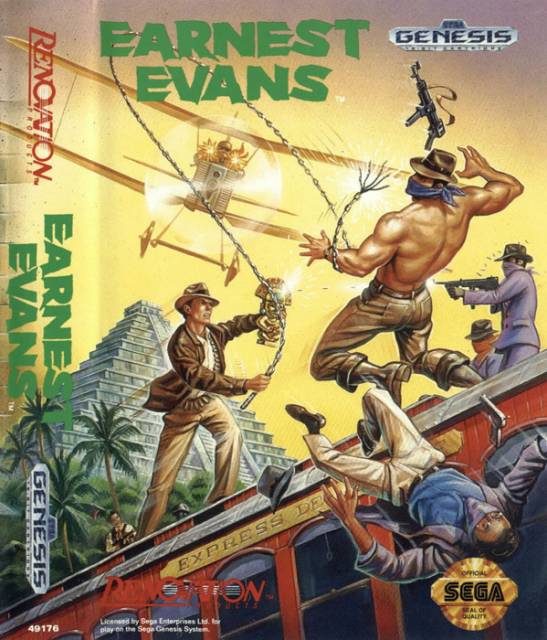
- Developer: Wolf Team
- Publisher: Wolf Team (JP) / Renovation (NA)
- JP Release: 1991-12-20*
- NA Release: 1992
- EU Release: N/A
- Franchise: Earnest Evans
- Genre: Action
- Theme: Archeological Study
- Premise: Earnest Evans, the third of his name, seeks to complete his grandfather's mission to keep three mystical idols out of the hands of evil, in his case a bounty hunter by the totally normal occidental name of Brady Tresidder. (In the Japanese version, their Earnest Evans is the original.)
- Availability: Nope. I assume Bandai Namco picked up the El Viento IP along with Wolf Team itself, and it's not like they're short of better retro games to re-release ad nauseam.
- Preservation: I wanted to start on an auspicious note, and the sheer weirdness and ambition of Earnest Evans is how it's managed to endure even if its awkward controls and zero chill leave much to be desired. The sequel to El Viento (#183), it was released in late December 1991 in Japan but only as a Mega CD game (hence the asterisk) with its cartridge-format NA localization showing up on some unknown date in 1992. Like its predecessor, the game plays vaguely like Valis with its speedy brawler-like energy, though the choice of animation style - where each of Evans's limbs is its own sprite - creates an especially uncanny effect whenever he moves or attacks. It also does that annoying thing where enemy damage is applied per frame of contact, so your health can be drained in an instant. The Mega CD version has CD audio and a smattering of anime cutscenes, which the cartridge version sadly (but understandably) lacks.
242: Rings of Power
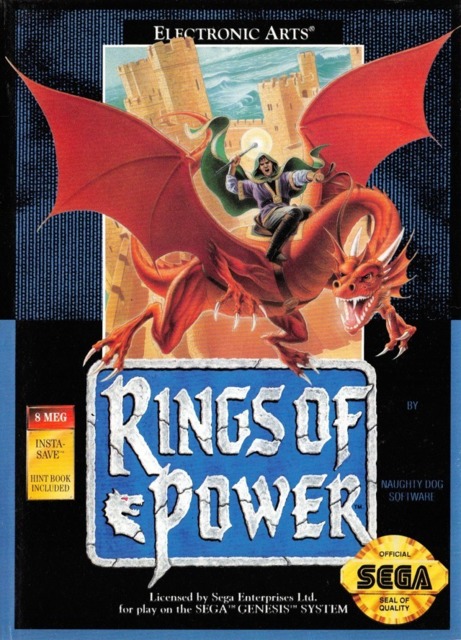
- Developer: Naughty Dog
- Publisher: Electronic Arts
- JP Release: N/A
- NA Release: January 1992
- EU Release: February 1992
- Franchise: N/A
- Genre: RPG
- Theme: Tolkienism
- Premise: Aid a little dude in a cloak and his fellowship in recovering the one ring, as well as a bunch of others, from... zombie Slash from GNR?
- Availability: Nope. I half-suspect Naughty Dog would prefer us all to believe that Crash Bandicoot was the first game they ever put out.
- Preservation: Oh hey there, Naughty Dog. Your first (and only) Sega console game is an isometric LOTR knock-off that skipped the PC platform? With a nude code? You scamps. Hearing about the development of this game, it sounds like the fledgling Naughty Dog - though they'd been around earlier as JAM Software, this was only their second game with the new label - kept butting heads with the publishers, EA, and the latter's decision first to bump the game from home computers (Amiga and PC) to the Genesis because EA saw those platforms as "weak," and their refusal to reprint the game after it sold out in several stores (which I'm in no hurry to believe actually happened) because non-sports games were also "weak." They make EA sound a totally inept, Trump-ian, divorced-from-reality, divorced-from-the-zeitgeist conglomerate of artless, oblivious moneymen, which honestly tracks with everything we know about them. II'd bet an almost identical back-and-forth happened with BioWare and Anthem in 2019. RoP is a bit meander-y and tough, but respect to Naughty Dog for putting out a huge, non-linear, open-world isometric RPG when that was far from the norm, even if they didn't try very hard to come up with an original story and setting.
243: Chibi Maruko-Chan: Waku Waku Shopping
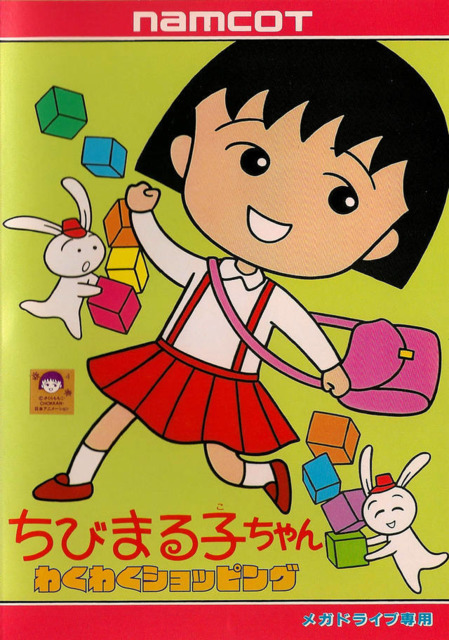
- Developer: Namco
- Publisher: Namco
- JP Release: 1992-01-14
- NA Release: N/A
- EU Release: N/A
- Franchise: Chibi Maruko-Chan
- Genre: Board Game
- Theme: Slice of Life Anime
- Premise: Maruko-chan decides to do some shopping, but it all gets a little too waku waku if you catch my meaning.
- Availability: Nope. Quickie licensed game so forget about it.
- Preservation: Chibi Maruko-chan must've been a big deal in her time, because the grade-schooler manga and anime has no less than fifteen game adaptations from multiple developers. This is her only Mega Drive appearance (though she'll pop up again in a Konami Saturn game) and like many of her tie-ins it's a board/party game intended for a younger audience. Like almost every other Japanese board video game, it's based on the Game of Life and is therefore an arbitrary mess of big numbers going up and down. What grade-schooler anime fan doesn't like math, though?
244: Super Fantasy Zone
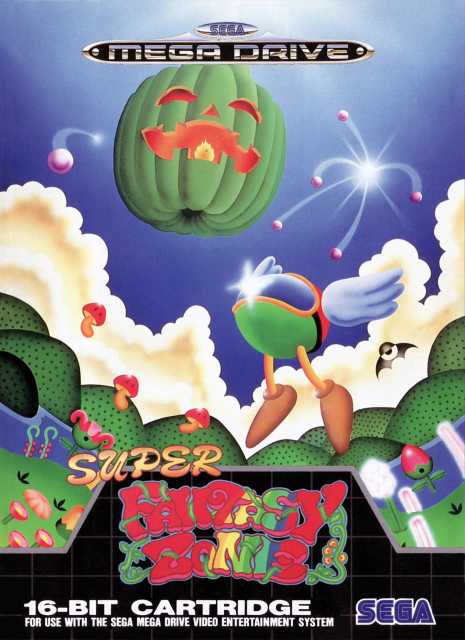
- Developer: Sunsoft
- Publisher: Sunsoft
- JP Release: 1992-01-14
- NA Release: N/A
- EU Release: 1993
- Franchise: Fantasy Zone
- Genre: Shoot 'em Up
- Theme: ...Fantasy?
- Premise: Opa-Opa needs your helpa-helpa murdering the cute monsters that killed his father, (no kidding) O-papa.
- Availability: It's on the Genesis Mini (all regions).
- Preservation: Sunsoft was given custodianship over Sega's day-glo shoot 'em up for its NES ports, since Sega employees turned to ash whenever they got close to Nintendo's Osaka headquarters back then. That led to Sunsoft taking charge on this semi-sequel/reboot for the Mega Drive. Curiously, the game skipped over North America: they could only get it digitally for the longest time, first via the Sega Channel and then eventually through the Wii Virtual Console. Like many other Mega Drive-exclusive "sequels" to classic Sega arcade games, it's not really a progression but an adaptation. Sunsoft knew better than to mess with perfection.
245: Tecmo World Cup '92
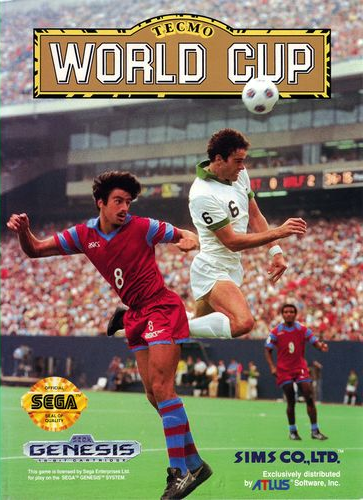
- Developer: SIMS
- Publisher: SIMS (JP) / Atlus (NA)
- JP Release: 1992-01-31 (as Tecmo World Cup '92)
- NA Release: December 1992 (as Tecmo World Cup)
- EU Release: N/A
- Franchise: Tecmo World Cup
- Genre: Soccer
- Theme: Pro Sports
- Premise: Put the round thing past the rectangle thing more times than the other guys.
- Availability: Nope. Sports games age like fine milk.
- Preservation: So here's the thing - there is no World Cup '92. There was a Euro '92, but the World Cup is every other two years (same as the Summer Olympics). Reason for the name is that this is a port of a two-year-old arcade soccer game, and it still couldn't get the list of qualifying teams right after all that time. I guess what I'm saying is that I'm not impressed so far, and that's even before factoring in my apathy for sports games and soccer in particular.
246: Toki: Going Ape Spit
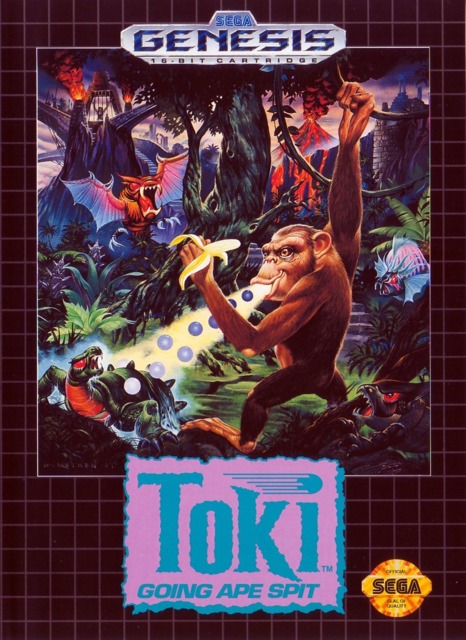
- Developer: Santos / Sega
- Publisher: Sega
- JP Release: 1992-01-31
- NA Release: Spring of 1992
- EU Release: March 1992
- Franchise: Toki
- Genre: Platformer
- Theme: Simianulator
- Premise: Rescue your kidnapped girlfriend and undo your monkey curse as the "expector-Ape" himself, Toki.
- Availability: This enhanced Mega Drive port is lost to time, but the game itself was graphically remastered just recently for Steam, Switch, Xbox One, and PS4 by Microids (the Syberia people?!).
- Preservation: Toki's a real weird game to research. It originated in arcades in 1989, developed by the Japanese developers TAD Corp, and the appeal of an apathetic ape who spits at animals must've caught on because it showed up on everything after that. Even got itself a shiny new graphical remaster.. It's not a remarkable game or anything, so I guess there must be some kind of atavistic appeal to an ape that spits fireballs. After all, were we all not ourselves fireball-spitting apes at one point in the distant past?
247: Wani Wani World
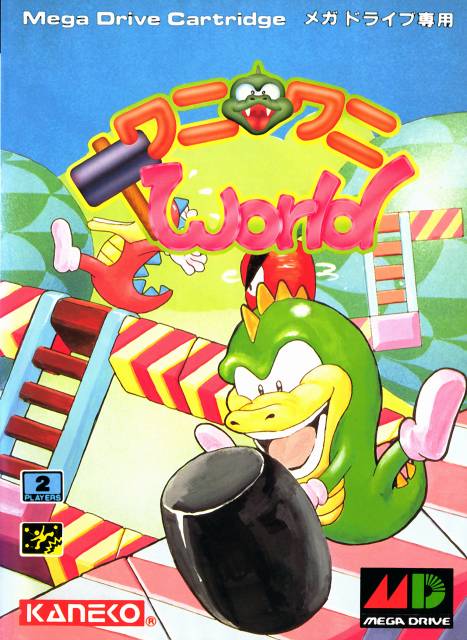
- Developer: Kaneko
- Publisher: Kaneko
- JP Release: 1992-01-31
- NA Release: N/A
- EU Release: N/A
- Franchise: N/A
- Genre: Platformer / Puzzle
- Theme: Alligators
- Premise: Cutesy hammer murder
- Availability: Nope. More like Kan't-eko.
- Preservation: I mean, this is just Lode Runner with a cartoon gator. You can't fool me. What's perplexing is where this came from; Kaneko adapted it from an earlier arcade game of theirs called Berlin no Kabe (or Berlin Wall, which was something else people were hitting with hammers around this time) but switched out the protagonist from some clown-looking kid. Alligators with hammers were something established elsewhere in the arcades: Namco's ubiquitous Wani Wani Panic, an animatronic "whack-a-croc" game which had you smack the alligators yourself. Seems a bit cheeky to riff on another developer's intellectual property, but it's far from the worst thing Kaneko's done where the Mega Drive's concerned (DJ Boy, for instance).
248: Alisia Dragoon
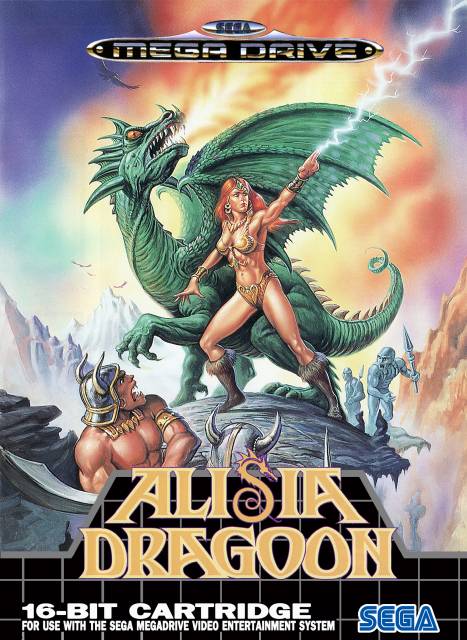
- Developer: Game Arts
- Publisher: Game Arts
- JP Release: 1992-04-24
- NA Release: February 1992
- EU Release: April 1992
- Franchise: N/A
- Genre: Action
- Theme: A Frank Frazetta Painting Come to Life
- Premise: A warrior maiden, Alisia, sets out to avenge her father (a lot of patricide this entry...) by defeating evil forces from beyond the stars.
- Availability: It's on the Genesis Mini (all regions).
- Preservation: Game Arts appeared before (they'd previously commissioned Yellow Horn for a mahjong manga tie-in (#84)) but this is the first Mega Drive game they developed on their own. They would become much more prominent on the Sega CD and Saturn, where they'll create two of the best-loved JRPG series of the CD-ROM era: Lunar and Grandia. Alisia Dragoon resembles yet another barbarian action game like Rastan Saga II or Dahna, but the actual mechanics have a completely different dynamic to them: Alisia relies on her powerful enemy-seeking lightning magic and companions, but you can't keep the fire button pressed too long or you'll hit an "overheat" stage and be quickly overwhelmed by enemy forces. You'll also need to turn around to hit those chasing you. It feels like a tense multi-directional crowd-control shooter with platforming, and a bit of an exploration emphasis as you hunt around for upgrades and power-ups to help weather the storm (and the impressive bosses). Despite not being a huge seller in its day, it's one of a handful of games to appear on the Mega Drive Mini purely due to its reputation. (Another odd characteristic is that Game Arts, who can usually handle story stuff just fine given their famous games are all RPGs, actually brought in Gainax to work on the art and story of Alisia Dragoon.)
249: Paperboy
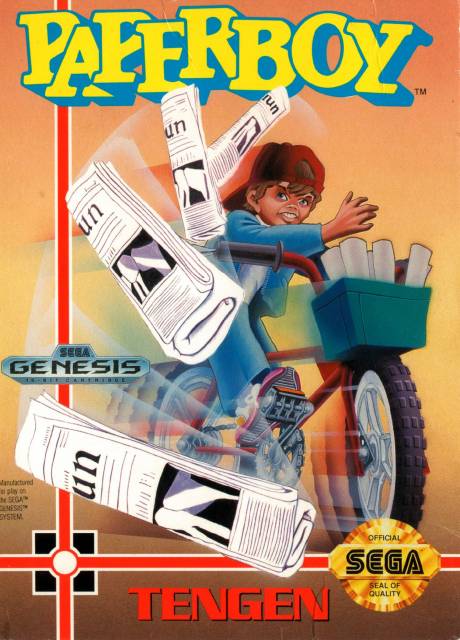
- Developer: MotiveTime
- Publisher: Tengen
- JP Release: 1992-06-26
- NA Release: February 1992
- EU Release: April 1992
- Franchise: Paperboy
- Genre: Action
- Theme: Part-time Drudgery
- Premise: Deliver them papers, son.
- Availability: I dunno, try iOS? Paperboy ports are like rats; you're never more than five feet away from one.
- Preservation: I wasn't aware of who MotiveTime was, but apparently it was the name Elite went by for a while. Elite's another UK games company like Ocean that reprogrammed and published a huge number of era-contemporary arcade games for home computers like the ZX Spectrum, Commodore Amiga, and Atari ST. They'd already worked on a home computer version of Paperboy, and were natural choices for the Genesis port. Otherwise, this is your run of the mill Paperboy game: deliver papers, watch out for dogs and mowers, try to cycle on that mythical sweet spot near the curb where nothing can reach you that a kid at school once told you about.
250: The Terminator
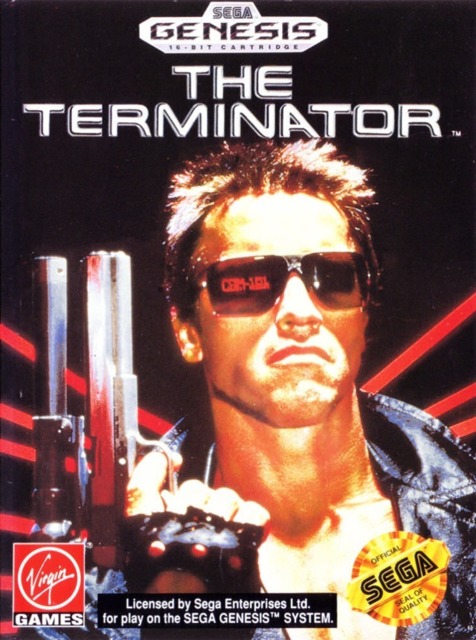
- Developer: Probe Entertainment
- Publisher: Virgin Games
- JP Release: N/A
- NA Release: February 1992
- EU Release: June 1992
- Franchise: The Terminator
- Genre: Side-scrolling Shooter
- Theme: "Technology Bad"
- Premise: Dun-dun dun dun-dun. Hear that? That's a metal man on his way to steal yo' girl.
- Availability: Nope. Last copy must've got dipped in molten steel or something.
- Preservation: There are so many Terminator games, and it runs into that odd issue - more prevalent in this era of pre-ESRB - where a premise is so cool that you can sell it to kids, even though they should not be allowed anywhere near the original source material until they can at least grow themselves some face fuzz. Termie didn't get an incongruous Saturday morning cartoon like RoboCop or the Toxic Avenger did, but this colorful bloopy shooter featuring everyone's favoite pre-ordained motherfucker Kyle Reese is clearly meant for a younger audience.
251: Winter Challenge
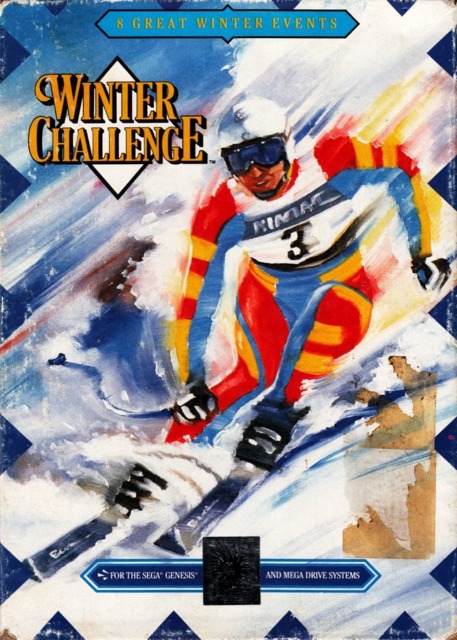
- Developer: MindSpan
- Publisher: Ballistic
- JP Release: N/A
- NA Release: February 1992
- EU Release: 1992
- Franchise: N/A
- Genre: Sports
- Theme: Sports
- Premise: Sports
- Availability: Nope. But if you're jonesing for some Olympiad action, you could always wait until this summer for the... oh, right.
- Preservation: Talking of sports games that don't have anything to do with any major global sporting events, wink wink, Winter Challenge is a winter sports compilation released the same year as a Winter Olympics (1992, Albertville) but based on a different, also unaffiliated, DOS game from the late 80s that was more likely released to coincide with a different Winter Olympics (1988, Calgary). This economic recycling could only come from Accolade, who are once again up to their old tricks by manufacturing unlicensed Mega Drive carts on the cheap through their Ballistic label. Winter Challenge did eventually get a "legit" rerelease a little while later, post-lawsuits.
252: Sorcerer's Kingdom / Sorcer Kingdom
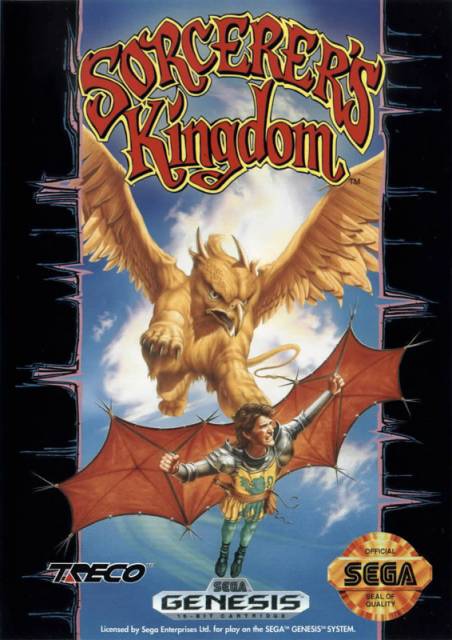
- Developer: Masaya
- Publisher: Masaya (JP) / Treco (NA)
- JP Release: 1992-02-07 (as Sorcer Kingdom)
- NA Release: August 1993 (as Sorcerer's Kingdom)
- EU Release: N/A
- Franchise: N/A
- Genre: RPG
- Theme: Fantasy
- Premise: Make a name for yourself as a hero as you run around solving everyone's problems in this vague and directionless game.
- Availability: Nope. Maybe Dracue Software, the ones behind the Assault Suits Leynos remake, could try remaking a few other Masaya games? ...They're out of business you say? Well this turned into a bummer fast.
- Preservation: Our old friends Masaya with another tactical RPG. The last game of theirs we encountered was Warsong/Langrisser, and Sorcerer's Kingdom has a similar combat system if not progression structure, with combat turning into a grid-based strategy affair only once roaming enemies get close enough. However, it decided to follow Final Fantasy II (a bad idea in general) by having specific stats improve after using them repeatedly. Beyond that it's a little on the plain side, but at least Masaya never sticks to one idea for too long.
253: Syd of Valis / Valis SD
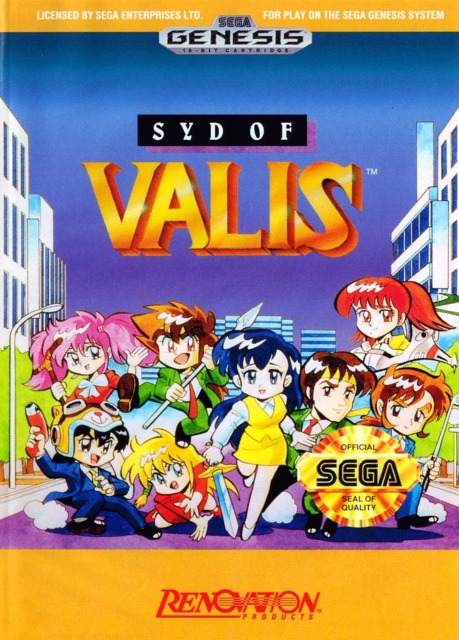
- Developer: Telenet Japan
- Publisher: Laser Soft (JP) / Renovation (NA)
- JP Release: 1992-02-14 (as Valis SD)
- NA Release: April 1992 (as Syd of Valis)
- EU Release: N/A
- Franchise: Valis
- Genre: Action
- Theme: Fantasy Leering
- Premise: It's Valis, so it's probably something to do with half-dressed chosen warrior maidens and creepy masked anime dudes, only now they're all chibi and shit.
- Availability: Nope. The Valis franchise was... handled somewhat irresponsibly, let's say, and I doubt anyone wants to wade through the muck to save it.
- Preservation: I can't get over the fact that Renovation chose to localize "Valis SD" as "Syd of Valis", even changing the name of series-wide heroine Yuko to Syd in cutscenes (but not in the manual?), because that was easier than trying to explain to a western audience what "SD" meant. Anime fans are familiar with "super deformation" - turning normally proportioned characters into tiny, crudely drawn babies for comedic effect - and that's pretty much what's going on with this game, which is a goofier retelling of Valis II with a lot more levity. If Renovation's localization uh-ohs weren't enough, they chose an unrelated PC Engine game's box art for the NA release. The mind truly boggles. There has to be a fun story out there somewhere about how little time and resources they had.
254: Traysia
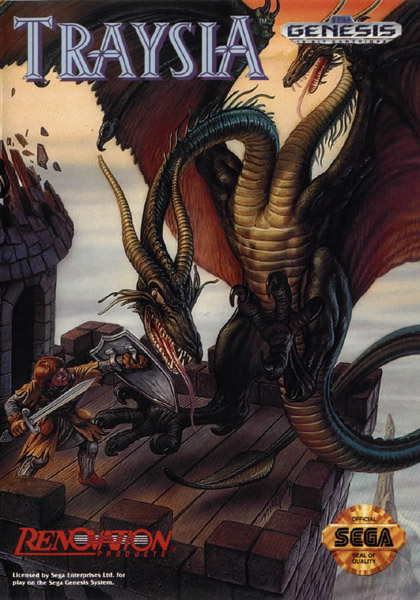
- Developer: Telenet Japan
- Publisher: Riot (JP) / Renovation (NA)
- JP Release: 1992-02-14
- NA Release: April 1992
- EU Release: N/A
- Franchise: N/A
- Genre: RPG
- Theme: Fantasy
- Premise: Courageous hero Roy is itching for adventure, and finds it when he accompanies his travelling merchant of an uncle across the world.
- Availability: Nope.
- Preservation: I get that every other fantasy RPG has a woman's name that has since fallen out of common use, but "Traysia" might be stretching a little (apologies to all the Traysias out there). This RPG is much like Masaya's Sorcerer's Kingdom, above, in that its combat predominantly uses a SRPG-type grid. Other than that it's as generic as they come, and Telenet Japan probably figured it'd be easier to sell something so mediocre to an RPG desert like the Mega Drive than try to break into the well-represented SNES JRPG market, which at the time was building up hype for Dragon Quest V and Final Fantasy V. At least Renovation picked out some germane box art for the game this time, rather than finding a random piece of manga art and calling it a day.
255: Two Crude Dudes
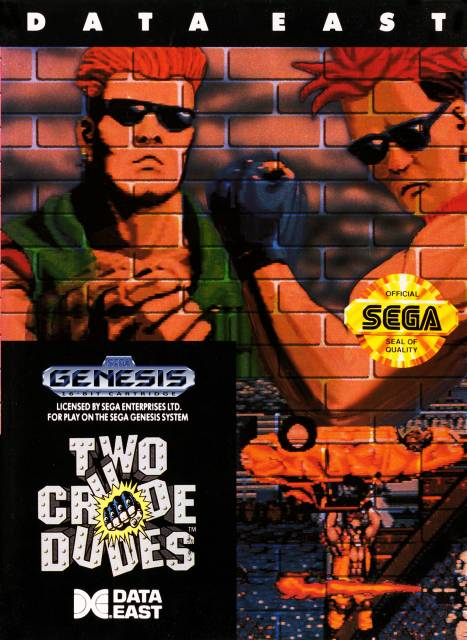
- Developer: ISCO
- Publisher: Data East
- JP Release: 1992-02-28 (as Crude Buster)
- NA Release: 1992 (as Two Crude Dudes)
- EU Release: May 1993 (as Two Crude Dudes)
- Franchise: N/A
- Genre: Brawler
- Theme: Post-Apocalyptic
- Premise: New York has been nuked, gangs have taken over (I guess the fallout doesn't bother them), and the US government - like the current administration - cares so little for its biggest city that it sends in two jocks with bad haircuts to save the day.
- Availability: No rereleases for the Mega Drive port, but the original arcade version is in the Data East Arcade Classics compilation for Wii.
- Preservation: Our last game for this entry is Two Crude Dudes, or Crude Buster, a mildly popular Data East brawler that found more success with its Mega Drive port. Possibly related to the Bad Dudes, the Crude Dudes are post-apocalyptic New York City's best shot at clearing out the Big Valley gang of hoodlums and mutants that have moved into the burned out buildings and molten streets after the nukes. I'm honestly not sure why anyone wants this version of New York back; it's not exactly in the best condition for re-habitation. I guess it's the principle of the thing? No-one wants to see a three-armed goon spraypaint obscenities on the side of the Empire State Building, in theory at least.
